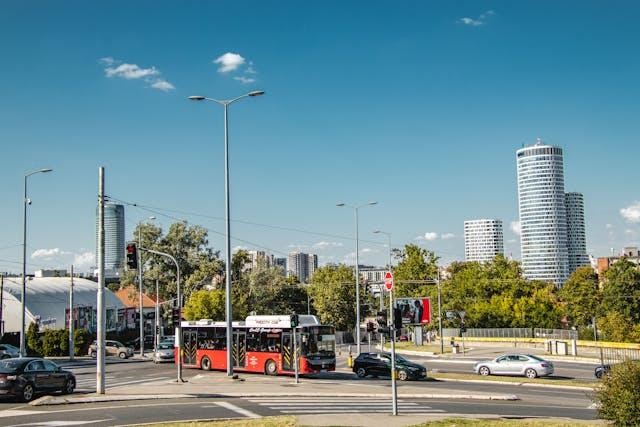
Serbian public transport isn’t just about getting from point A to point B as fast as possible. Each ride is a window into the culture, manners, and language.
Sure, things can get tricky if a local granny starts shouting at you seemingly for no reason. On the other hand, you may strike up a conversation, friendship, or even romance in a dusty old Belgrade bus.
So, no matter if you’re sightseeing or commuting to work. It’s the journey that counts, not the destination.
And wherever you’re headed, we’ve got you covered with a guide on local bus culture, etiquette, and the expressions you’ll need for a smooth ride. Let’s go!
If you’ve ever set foot on a Serbian bus, you’ll know it’s not just transport — it’s a mini-theatre. Everyone has their role: the ticket inspector, the grumpy driver, the chatty pensioners, and of course, you — the brave learner trying to figure out what on earth is going on.
On that note, check our survival guide on transportation in Serbia first if you’re new to local travel.
Here, though, we’re tackling bus etiquette and the phrases you’ll need along the way.
As of 2025, you can ride buses and trams in Belgrade for free. Cool, right?
That said, you’ll still need to get a ticket in all other cities, and of course, for intercity rides.
Whenever you’re catching a bus from the main station, pay for your ride at the ticket kiosk. Otherwise, you can purchase a ticket directly from the driver.
Depending on the city, you can also get a personalized card and top it up with any amount of money. Conveniently, such tickets often cost less than the ones you buy from the driver. So, it’s worth looking into that option if you’re staying in one city for a while.
In any case, always keep your ticket (or proof of purchase) until the end of the ride. If not, you’ll get more than just a stern look — you’ll get a story to tell (and probably a fine).
Phrases to remember:
On Serbian buses, not all passengers are created equal. The unspoken rule is that young folks stand up for older people, pregnant women, or parents juggling kids and strollers. Fail to do it, and you’ll feel the kind of laser-sharp stares that could melt steel.
On the flip side, there’s always someone who thinks their handbag deserves its own seat. Unless they’ve secretly bought it a ticket too, feel free to ask them to move it. They may huff, but they’ll do it.
Intercity buses are a different story. They technically have numbered seats… but this is Serbia, so rules are more like suggestions. Unless the bus is packed, most people sit wherever they please, and no one will bat an eye.
Also, although every passenger has the right to sit wherever they like, it’s polite to ask first. So, before sliding into an empty spot next to someone, you’ll usually hear a quick Je l’ slobodno? (Is this seat available?). It’s more about manners than permission, but skipping it might earn you a side-eye.
Phrases to remember:

In rush hour, you’ll get closer to strangers than you ever thought possible. Forget personal space — in Serbian public transport, you’re practically family after three stops.
And yet, there’s an unspoken code: no eye contact while squeezed together like sardines. Pretend you’re invisible and pray your stop comes soon.
Whenever you step on someone’s foot, don’t panic. A simple pardon (sorry) will sort it out.
Phrase to remember:
Serbian bus drivers are a breed of their own. One second, you’re flying through the streets like it’s Formula 1, the next you’re jolted awake because of a sudden brake. Bonus points if they’re simultaneously smoking, chatting, and driving with one hand.
Still, most drivers are kind and will help you out wherever they can.
Phrase to remember:
👍Pro tip: Technically, the Serbian word for bus driver is vozač, but most folks address them with majstore (literally master or boss). It’s the magic word — respectful, warm, and guaranteed to earn you a smile or maybe even a helpful announcement when your stop is coming up.

If the bus is late, overcrowded, or smells like yesterday’s ćevapi — don’t worry, you’re not alone. Complaining about public transport is like a national sport. Join in, and you’ll instantly sound local.
And here’s the thing: complaints aren’t just venting, they’re conversation starters. A sigh or a sarcastic comment is often enough for the person next to you to jump in and agree. Before you know it, you’re swapping stories about buses that never showed up, or debating which line smells the worst.
In Serbia, shared suffering equals bonding. And who knows, that stranger you were packed against like a sardine five minutes ago might just become your new buddy.
Phrases to remember:
If you’re into all things Balkan, using Serbian public transportation is a whole vibe — and a lesson in culture and language. So, next time you’re on board, don’t snooze. Soak in the chatter, the chaos, and the charm — all of it.
And while you’re at it, why don’t you level up your Serbian with our pre-intermediate course? Download it now and study whenever and wherever you like — even on a bus. Srećan put!